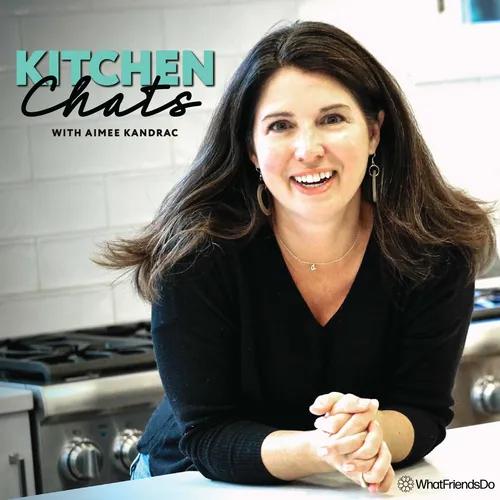Kitchen Chats with Aimee Kandrac Episode 7: Taking Care Of The Paperwork
- Author
- Aimee Kandrac
- Published
- Thu 01 Dec 2022
- Episode Link
- https://sites.libsyn.com/446388/kitchen-chats-with-aimee-kandrac-episode-7-taking-care-of-the-paperwork
When a life-changing event happens, paperwork inevitably follows. Aimee chats with Brian Thompson, JD, CFP, about the types of documents you want to have ready in case of an emergency. Brian also shares tips for picking professionals to help organize your legal and financial affairs and to make sure your friends and family know who to call in an emergency.
Episode Highlights
Start where you are.
While it can be uncomfortable to think about our own death or becoming disabled, those feelings are normal. With his clients, Brian begins by digging into the reasons why someone would be motivated to create an estate plan, such as leaving a legacy or taking care of their family. That motivation can often help them complete tedious tasks they might have put off otherwise.
“It’s scary to think about the worst things happening to you,” Brian said. “If you start with the why, we can then build a plan around that.”
Types of paperwork to consider.
Documents and policies you want to consider creating and keeping up-to-date include:
- An estate plan
- Disability insurance
- Health insurance
- Life insurance
For life insurance, Brian recommends keeping your life insurance policy separate from your other investments. This is most commonly done through term life insurance.
“With term insurance, you’re covered for the next 30 years while you build your wealth, grow your family, and take care of your kids,” Brian said. “After that 30 years, you’ll likely won’t need it anymore because you’ll be self-insured.”
While most people think about life insurance, you shouldn’t forget disability insurance -- especially because you’re 2- to 3-times more likely to become disabled than to die.
“Your biggest asset is your earning potential,” Brian said. “It’s not your house, it’s not your investment accounts, it’s your ability to earn money for decades, and if you aren’t able to do that, you’re in trouble, right?”
Secure your documents.
You’ll want to create a place where you securely store all of your important documents. Brian’s clients use an online portal for their estate plan, tax documents, cashflow documents, and more.
“In times of emergency, you already have enough stress,” Brian said. “It’s just going to add more stress to you to find where the documents are or that they’re 15 years old or having to get them organized.”
Brian also recommends creating a document that outlines all of your important information, such as your property, assets, people to contact, estate planner, insurance broker, and financial advisor. You can even Google “What My Family Should Know” or “What My Family Should Know” to find templates you can fill out.
“If you don’t feel like you can afford a financial plan, this is a great place to start,” Brian said.
Hire the right professionals.
If the thought of all this paperwork is making your head spin, you’re not alone. It can be overwhelming, which is why it’s helpful to have the right professionals.
“Friends and family will be there for you and will support you emotionally, but the nuts and bolts of the specifics of what needs to be done, you leave that to a professional,” Brian said. “The great thing about estate plans is that they can also provide a caveat that the person who is designated can hire a professional to help.”
Brian recommends having a good estate planning lawyer in your area to make sure you have the proper estate plan documents and that those documents are worded correctly, since estate laws are state specific. He also recommends hiring a financial planner who can take you step-by-step through the process.
“I always suggest going to a fee-only planner because then there’s no conflict of interest,” he said.
Resources + Links
- Financial Planning Resources: XY Planning Network, NAPFA, FPA
- Brian Thompson: Website, Twitter, Instagram, Facebook
- Aimee Kandrac: Website, Facebook, Twitter, LinkedIn
- WhatFriendsDo: Website, Instagram, Facebook, Twitter, LinkedIn
About Aimee and WhatFriendsDo
Aimee Kandrac is a speaker, consultant, and the co-founder and CEO of WhatFriendsDo. Her work is instrumental for organizing support during life-changing events, and she speaks to organizations about creative ways to help friends and family during times of crisis. Aimee has been recognized as a Top 50 Mompreneur by Babble.com and is the first female CEO in the state of Indiana to close a $500,000 funding round. She has been featured in Forbes, Time, the LA Times, Oprah.com, the Indianapolis Star, and more.
WhatFriendsDo is a simpler way to create organized and actionable support during a time of crisis. The free, online platform empowers healthcare facilities, HR departments, families, and friends to easily coordinate meals, errands, transportation, childcare, communication, and more for those in the midst of a life-changing event. The women-founded and women-led company started as a solution for a friend with terminal cancer. WhatFriendsDo is based out of Indianapolis.
